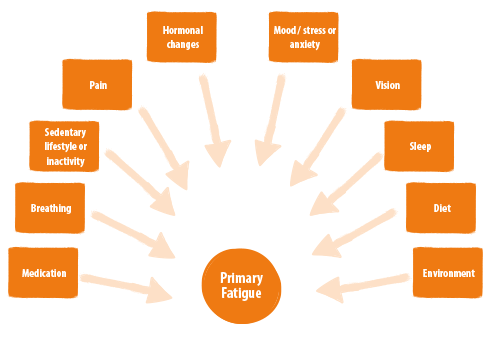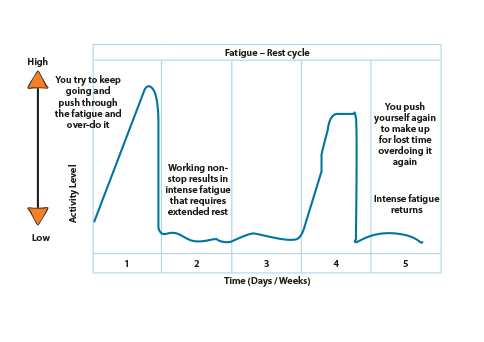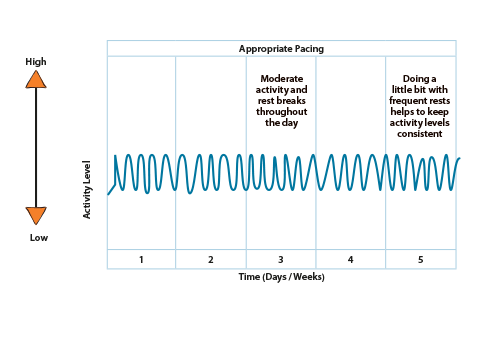Fatigue is a feeling of constant, overwhelming exhaustion, and weakness. It is a symptom of underlying conditions and not a condition itself. This means that it’s quite common for people with neuromuscular diseases to experience fatigue.
How to manage fatigue
People may feel fatigued by doing the simplest things, such as unpacking groceries or even writing something by hand – though the intensity varies from person to person.
Fatigue affects people in different ways and can be triggered at any time. This makes it difficult to explain to others. It is also why people suffering with fatigue often withdraw socially.
Symptoms of fatigue include:
- Poor appetite
- Low mood
- ‘Brain fog’ or the inability to remember things clearly
- Feeling like energy always needs to be ‘budgeted’
- Lack of motivation
- Difficulty starting or completing everyday tasks
From time to time, your needs may be re-assessed. However, your local authority should not reduce or withdraw a service from you without first re-assessing your needs. You can also ask for a re-assessment if you think your needs have changed.
Fatigue can happen to anyone. However, it is especially common among people living with muscle wasting conditions. Around 70% report fatigue, with many people describing it as their most troubling symptom.
Fatigue can be experienced at any stage and research has shown that it is not necessarily related to the physical severity of your condition.
There are two different kinds of fatigue:
- Primary fatigue. This manifests in the muscles and body as a neuromuscular disease.
- Secondary fatigue. This is not necessarily directly caused by neuromuscular disease, but by factors which may be a consequence of living with a neuromuscular condition.
Muscular endurance and physical stamina are limited in people with neuromuscular conditions. Your muscles may become tired more quickly than usual, causing them to shake, cramp, or ache. This is primary muscular fatigue.
However, there are many things besides muscle weakness that contribute to feeling tired. Examples of factors that may cause secondary fatigue include, but are not limited to, are:
- Environment
- Diet
- Sleep
- Vision
- Mood (stress or anxiety)
- Hormonal changes
- Pain
- A sedentary lifestyle
- Breathing
- Medication

There is no cure for fatigue, only symptom management. Here are some tips to help manage your fatigue but the first step in getting help with fatigue is to contact your GP.
Pace yourself – taking regular rests is one of the most useful fatigue management principles.
Avoid a ‘boom-bust’ cycle of activity – this is when you perform too many tasks or activity over a short period of time.
Get into a routine – a routine will help your body clock to naturally feel more energised.
Stop and listen – your body will tell you when it needs to rest. Learn to spot and listen to the signs.
The first graph shows the ‘boom and bust’ activity whilst the second graph demonstrates appropriate pacing of activity and tasks, helping to alleviate symptoms of fatigue.


Eating little and often – having small, frequent meals or snacks has been shown to help some people. However, cut out processed foods, caffeine, and alcohol. Try to eat fresh, seasonal fruit and vegetables.
Take food supplements – certain food supplements may help the body to receive all the necessary vitamins and minerals that it needs. Vitamin D is recommended for everyone and can be bought at most supermarkets. NHS guidelines are 10micrograms of Vitamin D per day.
Exercising is key – it is important to go outside or exercise even for short periods of time. Many people report that yoga or Pilates helps them exercise gently.
Living with fatigue can be frustrating. Read our Fatigue management for people with neuromuscular conditions resource, which includes worksheets and references or watch our Fatigue webinar.
For further advice or information, here are resources which may help with understanding fatigue and how to manage it.
Royal College of Occupational Therapists - How to manage your energy levels
NHS inform – Coping with fatigue
Brain & Spine Foundation – Adjusting to life with a neuro condition
Muscular Dystrophy News – Fatigue
SimplyEmma (disabled blogger’s personal experience) – Fatigue management: ways to manage fatigue with Muscular Dystrophy
Being diagnosed with a muscle wasting condition can often mean adjusting to a new and unexpected reality. Living with a muscle wasting condition can have an impact on every part of your life, including your mental health and wellbeing. Browse our mental health support.
Fatigue Webinar (2022)

We’re here to support you
Webinars, Information Days, and support groups for our muscle wasting community. Our life-changing support is here for you.
Advice for living with or caring for someone with a muscle wasting condition.